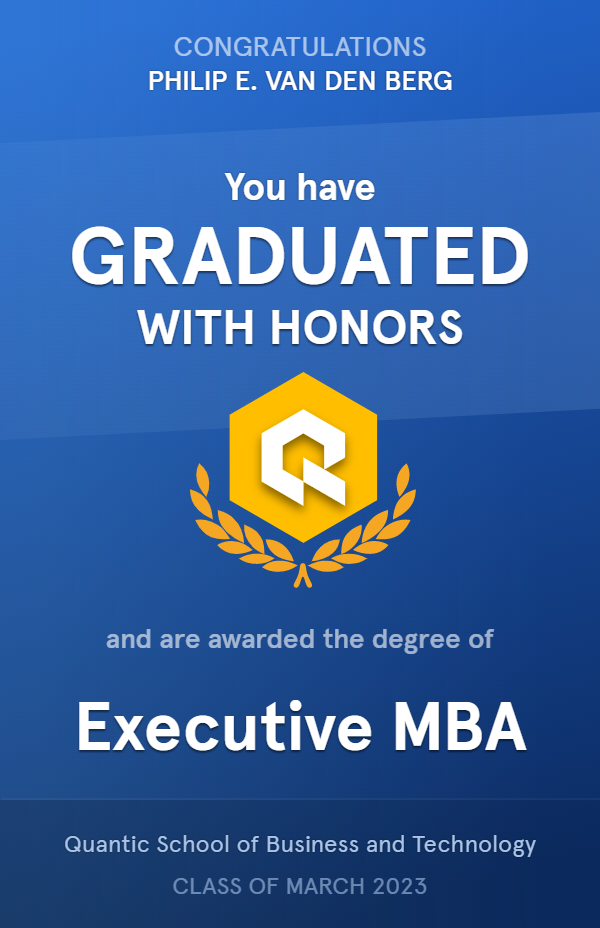From ‘dream’ to ‘done’: a next milestone achieved! – Last Saturday the mailman delivered a long desired certificate, my Executive MBA (with honours) degree.
As a B2B marketer, I see CX-centricity as a key competitive differentiator and growth marketing enabler. A truly customer centric organization involves all business disciplines and cannot be realize by marketing alone. During my career I have seen marketing more than once to be restricted or even isolated due to lack of good strategy, historical decisions, insufficient funding and suboptimal integration with other business functions. While expectations were high and everyone had an opinion on how to do marketing, the setup and conditions to be successful were only partly in place, causing a big dilemma. For this reason I wanted a deeper understanding all the aspects of a businesses required to be organized around customer, to fully embed marketing and to enable maximal growth and business result. My journey started in September 2021 when signed up for the Quantic EMBA 42D cohort which ran from January 2022 to March 2023. And it was more than worth every minute and penny invested; not only did I learn a lot, I also met tremendously interested and motived fellow students and got access to a great alumni network.
A giant thank you to my personal coach and spouse Caroline van den Berg-Kuehn, who with our two small boys had to miss me many evenings and Saturdays. During the EMBA year she not only gave birth to our second child but also started her own Personal Communications business. With her background in vocal performance and teaching, I can recommend her to all Quantic students and alumni to improve their online and face-to-face presence, presentation and communication, see www.caroline-coach.com.
A big thank you to my team mates at our Capstone Project on Sustainable Product Design Tarun Gupta, Bogdan Merza and Prechard Mhako, of the different project groups Ahmed ElGedwany (Gado), Abdullahi Muhammed, Teodor Parvanov, Evelyn Shumba and to my fellow board members at the Quantic Sustainability Group Theresa Reichlin, Alessandra Caggiano, Anirudh Kshemendranath, Ines Garcia, Cath Witten, Meghan Doffing, TJ Tweddle and Kelly Stafford.
And finally a big compliment for the Quantic School of Business and Technology leadership for the vision, courage and skills to set up a model that is truly global and disruptive. Its pure online setup and cost effectiveness make the E/MBA program accessible to those who otherwise would not have the opportunity. For me as an engaged father of two young kids, this was the best and probably only opportunity to completing an EMBA. And meeting ‘the world’ is truly enriching and exciting. Quantic though founded less then 10 years ago, has a vibrant network of almost 20.000 alumni and an endless calendar of events, accessible forever through the Quantic app. A special thanks to Grace Liaw for managing our cohort in a wonderful way!
Highly recommended to all marketers and non-marketers who want to make the best of their discipline.

Curriculum
The Quantic EMBA curriculum consists of a core part and of specialization course. The core curriculum consists of Accounting, Markets & Economies, Finance, Leading Organizations, Strategy, Data and Decisions, Marketing and Pricing, and Supply Chain & Operations. As specialisation course I choose Strategic Leadership, Start-up Entrepreneurship, Strategic Thinking and Business Communcations.
Capstone project
The highlight of an EMBA study is the capstone project, where a viable business plan that include the knewly obtained knowledge is included. Having done marketing consulting in the Systems Engineering world and as a board member of the Quantic Sustainability student Group, I got interested in sustainable product design and formed a four person project group.
Customers, investors and regulators increasingly demand that manufacturers pursue sustainable strategies. While the transformations to renewable energy for production and transportation and to recyclable packaging have gained momentum, it is still difficult to minimize the environmental impact of product design, to do so right from the start in the concept phase, to avoid the lock-in trap, and to do so in a cost-effective manner.
What is the environmental impact ‘lock-in’ trap? Sustainability is often not well embedded into business processes, as they date back to a time when decision criteria were centered around product functionality and profitability. Suboptimal decisions during the early stages of product design and development causes a cumulative lock-in, where it is increasingly complex and expensive to make changes: 80% of the sustainability impact is determined in the conceptual and detailed design phase.
We came up with a business idea for Agile Sustainable Concept Assessment (ASCA) consulting with a three-pillar offering consisting of a unique methodology, intensive moderation and evidence collection in a knowledge data lake (KDL). ASCA uses new, transparent and agile assessment methodology that is based on a relatively simple mathematical model with 5 metrics and 24 attributes, based on a weighting model developed 2021 by Ji Han, Pingfei Jiang and Peter R. N. Childs. It is agile as it allows to quickly change parameters and immediately show the environmental impact change. It includes inputs from all relevant stakeholders with both internal and external data sources. To avoid personal bias of certain characters, intensive assessment moderation with adequate social guidance is a key part of the offering. To analyze, understand and predict the environmental impact of product scenarios, the consulting is supported by a knowledge data lake (KDL) with machine learning capabilities (ML) and a cloud application as interface.
